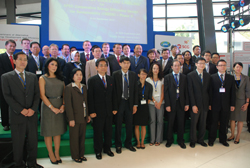News

Pursuing energy efficiency in new buildings is vital for developing countries. The building sector, including residential, commercial and public-service buildings, offers the largest potential for cost-effective GHG mitigation potential in the next two decades, says Expert.
To this end, the Energy Sector Management Assistance Program (ESMAP) discussed benefits of mainstreaming building energy efficiency codes in developing countries at a recent workshop organized by Asia-Pacific Energy Research Center under the auspices of the Asia-Pacific Economic Cooperation (APEC) in Bangkok, Thailand, September 8 -10, 2010. The workshop aimed to help APEC countries to prepare action plans to further their respective building energy code agenda, focusing and compliance and enforcement. The workshop was opened by the Minister of Energy of Thailand, Dr. Wannarat Channukuland attended by about 50 officials and experts from 11 countries and several international organizations, including the International Energy Agency, the United Nations Economic and Social Commission for Asia and the Pacific, and ESMAP.
ESMAP’s Feng Liu, Senior Energy Specialist, presented global experiences and lessons in developing and implementing building energy efficiency codes. His presentation was based on a recently completed study by ESMAP: Mainstreaming Building Energy Efficiency Codes in Developing Countries: Global Experiences and Lessons from Early Adopters. The study summarizes an extensive literature survey of the experiences of implementing building energy efficiency codes in developed countries and case studies of four developing countries—China, Egypt, India, and Mexico—and the state of California, United States. The objective of this report is to inform both the World Bank Group and its client countries about global best practices and emerging lessons from developing countries in the design and implementation of building energy efficiency codes.
Liu said, “Demand for modern energy services in residential, commercial, and public-service buildings will increase substantially in developing countries in the next two decades due to urbanization and growing income levels. Implementing building energy efficiency codes help prevent locking-in energy waste during the long life-cycle of buildings. This will yield high dividends in terms of reduced energy bills, improved comfort, lower greenhouse gas emissions, as well as add value to the economy. “
The enforcement of energy efficient standards in buildings is the biggest challenge. Liu said, even industrialized countries still face uneven and inconsistent enforcement of building energy efficiency codes. Non-compliance is mainly due to variations in local government political and resource support, robustness of the enforcement infrastructure, and conditions of the local construction market. With few exceptions, compliance enforcement of building energy efficiency codes in developing countries is either seriously lacking or nonexistent.
Liu added that the key challenges to improving compliance enforcement in developing countries include the level of government commitment to energy efficiency, the effectiveness of government oversight of the construction sector, the compliance capacity of domestic/local building supply chain, and the financing constraints. These challenges are surmountable in countries where economic growth is sustained and energy efficiency is pursued as a key element of national energy strategy. He called for increased international support to strengthen the compliance infrastructure for building energy efficiency codes in middle-income developing countries. Liu said there is need to urgently assist low- and lower-middle-income countries improve the effectiveness of government oversight for building construction, laying the foundation for the system to also cover building energy efficiency codes.
The workshop, APEC Cooperative Energy Efficiency Design for Sustainability (CEEDS) was a follow up to the 2007 Sydney Declaration where APEC Energy ministers requested APEC economies to individually set goals and formulate action plans to reduce energy intensity of gross domestic product by at least 25 per cent by 2030 (with 2005 as the base year). APEC established an Energy Working Group to compile best practices that can be used to help formulate and track progress towards such voluntary goals and action plans for improving energy efficiency.
Looking ahead, ESMAP’s Energy Efficient Cities Initiative(EECI) will continue to work with Asia Pacific Energy Research Centre (APERC)in promoting energy efficiency and low-carbon development in developing-country cities.
